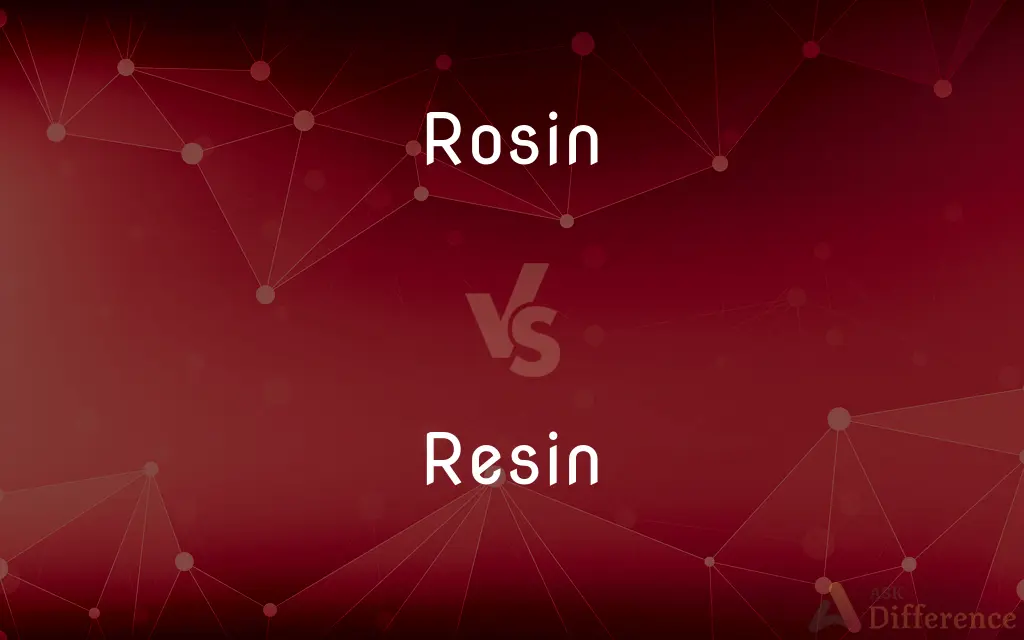Rosin vs. Resin — What's the Difference?
By Tayyaba Rehman — Updated on September 8, 2023
Rosin is a processed form of resin, often used to create friction on musical instruments like violins. Resin is a sticky, organic substance secreted by plants, primarily used in varnishes, adhesives, and other products.

Difference Between Rosin and Resin
Table of Contents
ADVERTISEMENT
Key Differences
Rosin is specifically treated and purified resin obtained from pine trees or other conifers. Resin, on the other hand, is the raw, viscous substance that trees or plants excrete, often when they are wounded. Rosin is more refined, while resin is in its natural, sticky form.
Rosin has found its primary use in the realm of music, used on the bows of string instruments like violins and cellos to increase friction. Resin, being a broader category, has diverse applications ranging from making varnishes and adhesives to being an ingredient in incense and perfumes.
Rosin is commonly found in a solid form and is less sticky, making it easier to handle. Resin can range from a viscous liquid to a hard, transparent solid. Rosin is often easier to work with due to its less sticky nature, while handling resin usually requires more care because of its adhesive qualities.
The words "rosin" and "resin" are often confused due to their phonetic similarity and because rosin is actually derived from resin. However, these two substances are used in different contexts and have distinct properties, which make them unique in their own rights.
Comparison Chart
Source
Processed form of resin
Raw organic substance
ADVERTISEMENT
Stickiness
Less sticky
Very sticky
Form
Usually solid
Can be solid or viscous liquid
Primary Use
Musical instruments
Varnishes, adhesives
Handling
Easier to handle
Requires careful handling
Compare with Definitions
Rosin
Rosin is a solid form of resin used in string instruments.
The violinist applied rosin to her bow before the concert.
Resin
Resin is an organic substance secreted by plants.
The tree was oozing resin from where it was cut.
Rosin
Rosin is used in the soldering process.
I need some rosin to flux the solder.
Resin
Resin is used in making varnishes.
The artist used a resin-based varnish for the painting.
Rosin
Rosin is used in dance to provide grip.
The dancers sprinkled rosin on the stage for better grip.
Resin
Resin is used in plastics and other synthetic materials.
Some plastics are made of synthetic resins.
Rosin
Rosin is used in athletics for grip enhancement.
The gymnast used rosin on his hands before mounting the rings.
Resin
Resin is used in adhesives.
Epoxy resins are extremely strong adhesives.
Rosin
Rosin is used in printmaking processes.
Rosin is sprinkled on the plate to create texture in aquatint.
Resin
Resin is used in incense and perfumes.
The resin from the myrrh tree is used in some traditional perfumes.
Rosin
Rosin (/ˈɹɒ.zən/), also called colophony or Greek pitch (Latin: pix graeca), is a solid form of resin obtained from pines and some other plants, mostly conifers, produced by heating fresh liquid resin to vaporize the volatile liquid terpene components. It is semi-transparent and varies in color from yellow to black.
Resin
In polymer chemistry and materials science, resin is a solid or highly viscous substance of plant or synthetic origin that is typically convertible into polymers. Resins are usually mixtures of organic compounds.
Rosin
Resin, especially the solid amber residue obtained after the distillation of crude turpentine oleoresin, or of naphtha extract from pine stumps. It is used in adhesives, varnishes, and inks and for treating the bows of stringed instruments
Liquid rosin flux
They will also supply crushed colophony rosin
Resin
A sticky flammable organic substance, insoluble in water, exuded by some trees and other plants (notably fir and pine)
Clear resin had oozed to the surface, trickled down, and set
Rosin
Rub (something, especially a violin bow or string) with rosin
Island musicians are rosining their bows
Resin
A solid or liquid synthetic organic polymer used as the basis of plastics, adhesives, varnishes, or other products
Epoxy resins frequently cause dermatitis
The chassis is constructed of synthetic resin
Rosin
A translucent yellowish to dark brown resin derived from the stumps or sap of various pine trees, composed chiefly of abietic acid and related compounds, and used to increase sliding friction, as on the bows of certain stringed instruments, and to manufacture a wide variety of products including varnishes, inks, linoleum, adhesives, and soldering compounds. Also called colophony.
Resin
Rub or treat with resin
Resined canvas
Rosin
To coat or rub with rosin.
Resin
Any of numerous clear to translucent yellow or brown, solid or semisolid, viscous substances of plant origin, such as copal, rosin, and amber, used principally in lacquers, varnishes, inks, adhesives, plastics, and pharmaceuticals. Resins are usually insoluble in water.
Rosin
(organic chemistry) A solid form of resin, obtained from liquid resin by vaporizing its volatile components.
Resin
Any of numerous physically similar polymerized synthetics or chemically modified natural resins including thermoplastic materials such as polyvinyl, polystyrene, and polyethylene and thermosetting materials such as polyesters, epoxies, and silicones that are used with fillers, stabilizers, pigments, and other components to form plastics.
Rosin
Resin.
Resin
To treat or rub with resin.
Rosin
(transitive) To apply rosin to (something); to rub or cover with rosin.
We waited expectantly as the guest violinist rosined his bow in preparation for playing.
Resin
A viscous hydrocarbon secretion of many plants, particularly coniferous trees.
Rosin
The hard, amber-colored resin left after distilling off the volatile oil of turpentine; colophony.
Resin
Any of various yellowish viscous liquids or soft solids of plant origin; used in lacquers, varnishes and many other applications; chemically they are mostly hydrocarbons, often polycyclic.
Rosin
To rub with rosin, as musicians rub the bow of a violin.
Or with the rosined bow torment the string.
Resin
Any synthetic compound of similar properties.
Rosin
Any of a class of solid or semisolid viscous substances obtained either as exudations from certain plants or prepared by polymerization of simple molecules
Resin
(transitive) To apply resin to.
Rosin
Rub rosin onto;
Rosin the violin bow
Resin
Any one of a class of yellowish brown solid inflammable substances, of vegetable origin, which are nonconductors of electricity, have a vitreous fracture, and are soluble in ether, alcohol, and essential oils, but not in water; specif., pine resin (see Rosin).
Resin
Any of various polymeric substance resembling the natural resins[1], prepared synthetically; - they are used, especially in particulate form, in research and industry for their property of specifically absorbing or adsorbing substances of particular types; they are especially useful in separation processes such as chromatography; as, an ion-exchange resin.
Resin
Any of a class of solid or semisolid viscous substances obtained either as exudations from certain plants or prepared by polymerization of simple molecules
Common Curiosities
What is Rosin?
Rosin is a processed, less-sticky form of resin used primarily on the bows of string instruments.
Can Rosin and Resin be used interchangeably?
No, they have different properties and uses.
Is Rosin edible?
No, it's not recommended for consumption.
What is Resin?
Resin is a natural, sticky organic substance secreted by plants.
Is Rosin flammable?
Generally, yes, it can catch fire.
Is Resin edible?
Some types of resin are edible, but many are not.
How is Rosin used in music?
It's applied to the bows of string instruments to increase friction.
Is Rosin only used for musical instruments?
No, it also has applications in dance, sports, and industrial processes.
How is Resin used in crafts?
It's often used in varnishes and adhesives.
Is Resin flammable?
It depends on the type, but generally, it is flammable.
Is Resin only from trees?
No, some plants also produce resin.
Is Rosin made from Resin?
Yes, rosin is a processed form of resin.
What is the main component of Rosin?
The main component is abietic acid.
What is the main component of Resin?
It varies but can include terpenes, oleoresins, and others.
Are Rosin and Resin expensive?
Rosin is generally more expensive due to its processing, while resin's cost can vary.
Share Your Discovery

Previous Comparison
Retribution vs. Revenge
Next Comparison
Addicting vs. AddictiveAuthor Spotlight
Written by
Tayyaba RehmanTayyaba Rehman is a distinguished writer, currently serving as a primary contributor to askdifference.com. As a researcher in semantics and etymology, Tayyaba's passion for the complexity of languages and their distinctions has found a perfect home on the platform. Tayyaba delves into the intricacies of language, distinguishing between commonly confused words and phrases, thereby providing clarity for readers worldwide.














































